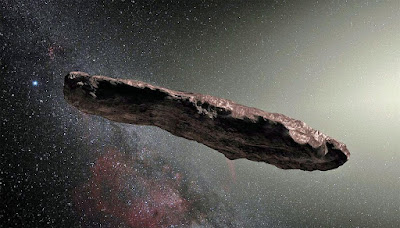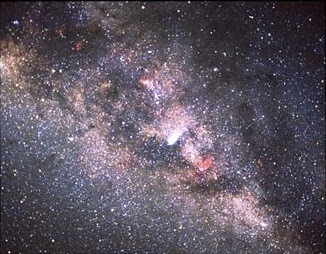 | ||
| Oumuamua |
He wanted to know what I thought of the possibility that Oumuamua is actually an engineered space craft of some sort, and also what I thought would be the theological implications of discovering that there really are other civilizations elsewhere in the cosmos.
These are interesting questions and since there may be others who wonder about them and since I've posted about these topics in the past, I thought I'd rerun a couple of those posts.
Today I'm putting up one that gave my response to the matter of the theological implications of the discovery of extraterrestrial life. Actually, the post summarizes the thinking of a chemist named Kirk Durston. He takes a position that may seem counterintuitive to some readers, so see what you think.
Here's what I posted in May of 2018:
Although it's hard to see exactly why, many people are of the mind that if scientists ever discovered life on other planets it would be a devastating blow to theistic belief. It's apparently thought that theism, particularly Christian theism, entails the belief that life was created only on earth and nowhere else and that the discovery of life in some distant locale would thus refute theism.
Protein chemist Kirk Durston has a different take on the matter, though. He argues that if life were ever to be discovered elsewhere in the universe it would be a devastating blow, not to theism but to atheism.
Here is the gravamen of his essay:
When it comes to the idea that life spontaneously self-assembled itself in the past, thousands of our brightest minds have worked on the problem for over half a century with no prospect of success in the foreseeable future. In fact, the more we learn, the more we realize how difficult the problem is. The challenge is three-fold. First, we have to figure out how intelligent scientists can create a simple life form from scratch in the lab.Durston's last two paragraphs bear emphasizing: Life elsewhere in the cosmos would not be especially surprising given the truth of theism, but on the assumption that atheism is true the discovery of extraterrestrial life would be breathtakingly astounding.
Second, having done it ourselves, we have to see if realistic natural processes can do the same thing. The third problem is vastly more difficult: figure out how the information to build life forms gets encoded in these self-replicating molecules without an intelligent programmer. We are still working on the first problem, with no hint of success on the horizon. That might be significant, right there.
A 2011 article in Scientific American, “Pssst! Don’t tell the creationists, but scientists don’t have a clue how life began,” summarized our lack of progress in the lab. Of course, there are plenty of scenarios, but creative story-telling should not be confused with doing science, or making scientific discoveries. With regard to “thousands of papers” published each year in the field of evolution, as Austin Hughes wrote, “This vast outpouring of pseudo-Darwinian hype has been genuinely harmful to the credibility of evolutionary biology as a science.”
Evolutionary biologist Eugene Koonin, meanwhile, calculates the probability of a simple replication-translation system, just one key component, to be less than 1 chance in 10^1,018 making it unlikely that life will ever spontaneously self-assemble anywhere in the universe. His proposed solution is a near-infinite number of universes, something we might call a “multiverse of the gaps.” ....Indeed, we would need a vast number of universes all working on the problem to get lucky enough to see life spontaneously assemble itself in just one of them.
The probability of life spontaneously self-assembling anywhere in this universe is mind-staggeringly unlikely; essentially zero. If you are so unquestioningly naïve as to believe we just got incredibly lucky, then bless your soul.
If we were to discover extraterrestrial life, however, then we would have had to get mind-staggeringly lucky two times! Like the forensic detectives at the lotteries commission, a thinking person would have to start operating on the well-founded suspicion that “something is going on.”
The discovery of extraterrestrial life would be the death knell for atheism, at least for the thinking atheist. On the other hand, such a discovery should not be in the least surprising, if there is a supernatural Creator who has designed the universe to support life, and has brought about life and beauty throughout the universe, even if no human ever gets to see it.
It's truly ironic that so many of those who fervently hope to find evidence of extraterrestrial organisms are themselves metaphysical naturalists, i.e. atheists. These folks are apparently eager to find evidence that their most important metaphysical commitments are wrong. That just seems odd.
